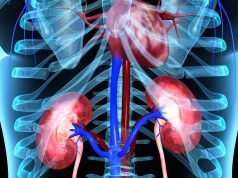COVID-19 patients with end-stage renal disease 11 times more likely to be hospitalized versus patients with no kidney disease
THURSDAY, Dec. 10, 2020 (HealthDay News) — Kidney disorders are the strongest preexisting factor associated with COVID-19-related hospitalization, according to a study published online Nov. 12 in PLOS ONE.
Matthew T. Oetjens, Ph.D., from the Geisinger Health System in Danville, Pennsylvania, and colleagues used electronic health record data to assess pre-COVID-19 pandemic clinical phenotypes (12,971 individuals) associated with hospital admission for COVID-19.
The researchers found that 1,604 patients were severe acute respiratory syndrome coronavirus 2-positive and 354 required hospitalization. Twenty-one clinical phenotypes in five disease categories met phenome-wide significance, including six kidney phenotypes (e.g., end-stage renal disease or stage 5 chronic kidney disease: odds ratio [OR], 11.07), six cardiovascular phenotypes (e.g., congestive heart failure: OR, 3.8), five respiratory phenotypes (e.g., chronic airway obstruction: OR, 2.54), and three metabolic phenotypes (e.g., type 2 diabetes: OR, 1.80). When defining chronic kidney disease based on estimated glomerular filtration rate, a similarly high risk of hospitalization was associated with preexisting stage 4 chronic kidney disease (OR, 2.90), stage 5 chronic kidney disease with dialysis (OR, 8.83), and kidney transplant (OR, 14.98).
“Our team used a novel approach made possible by our extensive electronic health records, unique demographic data, and integrated health system,” a coauthor said in a statement. “We were able to perform this study despite having a much lower number of COVID-19 cases compared to large hospitals in metropolitan areas.”
Copyright © 2020 HealthDay. All rights reserved.








